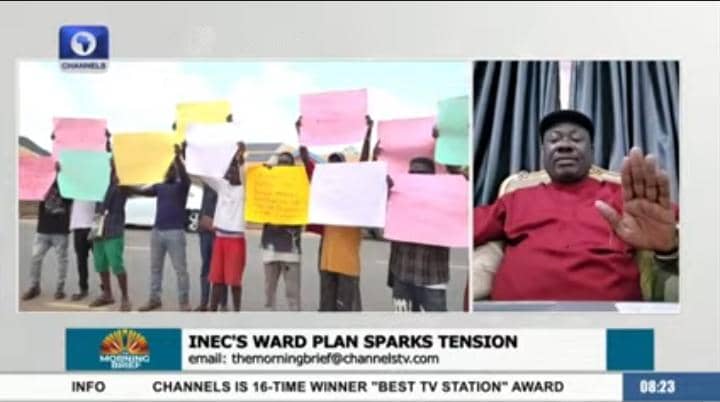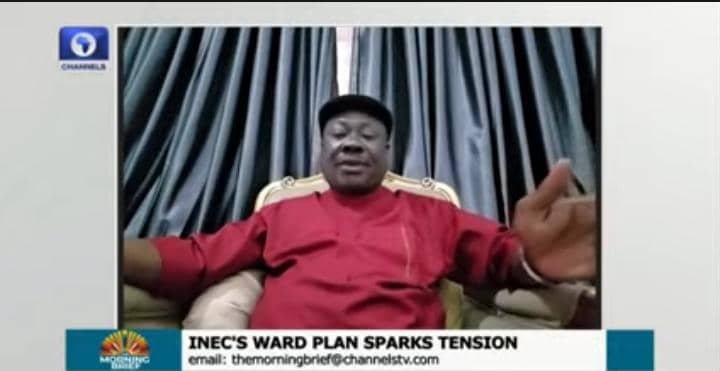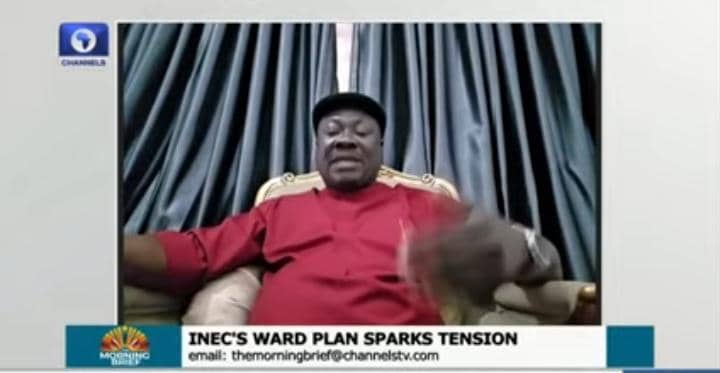/ Politics
Views: 2391
Justice at Last: Dr. Paul Bebenimibo Hails INEC’S Transparent Ward Delineation in Warri

Dr. Paul Bebenimibo, an Ijaw leader and local stakeholder in Warri, has applauded the Independent National Electoral Commission (INEC) for its recent ward delineation exercise, describing it as a historic step toward correcting decades of ethnic imbalance and marginalization in Delta State’s political landscape.

In a compelling interview with Channels Television on Thursday, Dr. Paul Bebenimibo revealed how INEC’s new ward delineation has brought long-awaited equity to the Ijaw and Urhobo ethnic groups, who for years were sidelined by what he called an "arbitrary and unjust arrangement."

“Previously, the delineation process was done without fairness, which led to the marginalization of the Ijaws and Urhobos,” Bebenimibo said. “That’s why we went to court, and the court ordered a fresh and proper delineation. What we now have is a reflection of the actual demographic and geographic realities on ground.”
Bebenimibo emphasized that the revised arrangement was not crafted in a boardroom but built from fieldwork and real community engagement. “INEC did not just sit down and write ward allocations. They visited the communities—Urhobo, Itsekiri, and Ijaw—using cartographic and photographic tools to gather data. The outcome is based on facts, not sentiment,” he explained.
The result of the reorganization has shifted the electoral map in key areas:
- Warri North LGA
- Previous Allocation: Ijaws (4), Itsekiris (6)
- New Allocation: Ijaws (10), Itsekiris (8)
- Warri South West LGA
- Previous Allocation: Ijaws (4), Itsekiris (6)
- New Allocation: Ijaws (14), Itsekiris (5)
- Warri South (Ogunu axis)
- Urhobos: Increased to 9 wards (from 2–3)
- Itsekiris: Now have 8 wards (from about 6–7)
- Ijaws: Now have 3 wards
“This is the first time we are seeing justice done in Warri,” Bebenimibo said, noting that the new configuration recognizes long-established Ijaw communities such as Gbaramatu, Isakpa and Obijaws in Warri South West as significant population centers.
The Ijaw local representative said the new structure not only addresses historical injustices but also brings hope for peace and development. “We’ve suffered from prolonged crises that left parts of Warri without basic infrastructure like electricity. Now, with fairness restored, we can rebuild,” he said.
He added that the exercise was inclusive, citing the participation of all stakeholders—including three local point persons and 12 others representing various ethnic groups—from the beginning of the process on February 4, 2023, through to the conclusion.
“INEC did a thorough and credible job. They didn’t exclude anyone. Anyone who wishes to verify this can do so—there is photographic and demographic data backing it,” Bebenimibo asserted.
While acknowledging that some may feel aggrieved by the outcome—particularly members of the Itsekiri community—Bebenimibo stressed the importance of peace over protest.
“We understand their concerns, and we respect their right to respond. But violence won’t change the facts. This process went through multiple legal levels, including the Federal Court. INEC followed due process.”
He urged community leaders to embrace the truth and educate their people rather than incite them. “Prominent individuals should promote peace, not conflict. This is our chance to move beyond Warri’s dark history of violence.”
The final ward report, sealed and presented last Friday in Asaba in the presence of all ethnic representatives—including the Itsekiris, Urhobos, and Ijaws—was a transparent process with no prior leaks. “Even INEC didn't know the contents before the seal was broken,” he note.
As a concluding note, Bebenimibo called for mutual understanding and permanent solutions. “Let those who say they have the numbers present the facts. We've made our case with evidence, and the records are clear.”
He reaffirmed the Ijaw community’s readiness for dialogue and expressed hope that all ethnic groups would come to the table for peaceful resolution.
“In the spirit of fairness,” he added, “we welcome a right of reply from the Itsekiri representatives. Let’s have a balanced discussion, built on facts and focused on the future.”
Dr. Paul Bebenimibo’s comments offer insight into the background and significance of this major political development in Delta State.